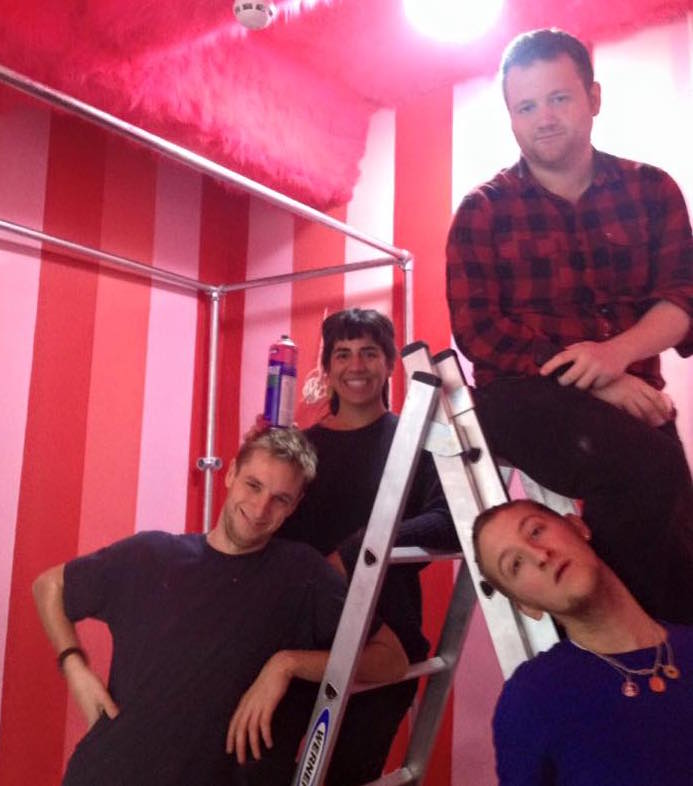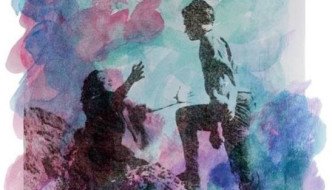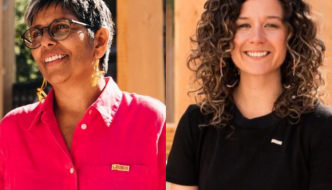 We caught up with Leeds based art collective Precious, as they finish their room at the new Art Hostel, to chat social engagement, the colour pink, and possible sleep-in exhibitions.
We caught up with Leeds based art collective Precious, as they finish their room at the new Art Hostel, to chat social engagement, the colour pink, and possible sleep-in exhibitions.
TSOTA: Tell us a little bit about yourself. Who are you, what influences your work and what mediums do you work in?
Precious: Precious Art Collective is made up of university graduates and we’re based in Leeds. We are painters, drawers, photographers, sculptors and artists of the digital realm. Individual members are Alex Gilmour, Freya Kruczenyk, Alex Milhouse-Smith, Rufus Newell, Zoe Spowage and Rosie Vohra. We all have our own practices as well as our collective work as Precious.
We believe in a sense of community and freedom from elitism in art. We look to mount exhibitions that engage with the public on a fun, informal and interactive basis. In the spirit of a long history of Leeds’ DIY initiatives, our projects come to you not as a refined aesthetic experience but as a rough re-shaping of reality.
TSOTA: When exhibiting within white walled gallery spaces there is a danger that work will only be seen by a certain demographic. Why is working out of these spaces important to you?
Precious: We want our shows to be enjoyed and remembered by all types of people, inside and outside the artistic community. Working in spaces such as the art hostel is vital for us to appeal to a wider public facing audience, locally and nationally.
TSOTA: You often work within communities, presenting work that can be viewed by a range of people. How can working within communities effect these areas?
Precious: We don’t feel we’ve worked within a specific community. Perhaps by taking up certain opportunities we’ve found ourselves ‘working in the community’, But at the same time we’ve done things that remove us from that exact thing. We did a show in Sheffield with ‘Its All Tropical’ (Sheffield) and ‘Das Balloon’ (Brighton). It was open to the public and we didn’t try and steer it away from the public in any way but it just didn’t reach them. It was only people within Leeds’, Sheffield’s and Brighton’s artistic communities that might have known about that show, so then they’re the only people that turn up. On the other hand, we did ‘Not 2 Precious’ on Duncan Street in Leeds city centre. It was a big open space and we were there for a few days, there were big windows for people to be able to see from the street and into the space, we could see people were interested, so we gave them a nudge and got them inside.
The main difference between the two shows is location. The show in Sheffield was on the outskirts of Sheffield’s centre, an area just outside of Kelham Island, the show in Leeds was in the city centre. The show in the centre of town is naturally going to draw in a wider audience.
TSOTA: Precious is currently working on a room in the new Art Hostel. Could you describe the room, the themes and ideas behind it?
Precious: The room has proved to be a new venture for us into interior design. We wanted to combine designing a room and creating a space for displaying practical and functional art. Naturally we have used, what has become our signature colour, pink, as a starting point. Specifically looking at the the Baker Miller shade which has become synonymous with having a calming and relaxing influence over anyone exposed to it. Although this might not be the case it provided us with a good starting point. We have also put pink fur on the ceiling and stripes down the walls as a way to make the room feel unique, sexy and comfortable. The last move for us is to add our art work which we have yet to do, but we are looking at wooden hands as shelves, a black silk dressing gown as decoration and coloured transfers on some of the windows.
TSOTA: Why is it so important to work on projects like the Art Hostel?
Precious: Working on these projects provides us with an opportunity to reach a wider audience within a very collaborative and exciting setting. It was a real honour for us to be asked by East Street Arts and we felt committed to challenging ourselves and staying true to our fine art roots.
TSOTA: How far do you think the Art Hostel will influence the ever-expanding art scene in Leeds?
Precious: It will undoubtedly become a high point for Leeds’ growing art scene and feels like a real focal point for socially engaged projects. Putting a hostel in Leeds, and calling it an ‘Art Hostel’ already gets people interested in the creativity that Leeds has to offer. Hopefully then, once a guest is booked in and arrives at the hostel, that’s it: they’re plugged in to Leeds. We’re imagining tons of information about what’s happening to be readily available to the guests, whether it be a calendar, posters or leaflets. The information will be there and the most valuable of the sources would be word of mouth. There are always murmurs within Leeds as to who’s doing what, when and where. All that information is hopefully going to be in the Art Hostel for guests to pick up and run with. Then, once they’ve chosen a show and been to see it, who knows who they’re going to meet and what events they’re going to find out about.
TSOTA: ‘Social engagement’ has become an important term and buzzword within the art industry. What are your views about the meaning of this word? Can it be helpful to attract new communities to art?
Precious: It’s a good word, and it’s a good thing. It’s not at the heart of our practice, but it’s something that we’re interested in. It’s a good tool to combat art elitism although we’re not sure if the term itself can attract new communities in art. If artists and institutions have the term in mind when creating and curating, then it can only a positive thing.
TSOTA: How ‘socially engaged’ do you feel Precious is?
Precious: We see ourselves as being fairly socially engaged and committed to welcoming new audiences. With all our shows we want people to feel excited and involved. Often we have open stages, film screenings, artists talks and crit clubs coinciding with our shows.
TSOTA: Has this experience (with the Art Hostel) allowed you to explore new modes of working as artists? How?
Precious: We are still working on the hostel so its hard to judge its impact yet, but it has definitely made us think about spaces we show work in as a whole. Perhaps we should start thinking about how audiences could spend more time in our shows and sleep in them?
TSOTA: Aside from your work with the Art Hostel, what else is coming up for you?
Precious: We have a few individual projects in the pipe line, but as a collective we are looking at doing a couple shows in Leeds (one of those potentially being at a hot new space, coming soon) and we’re also lining up a show in Bristol.
Check out some of Precious Collective’s work here. Find out more about the Art Hostel here.



Comments